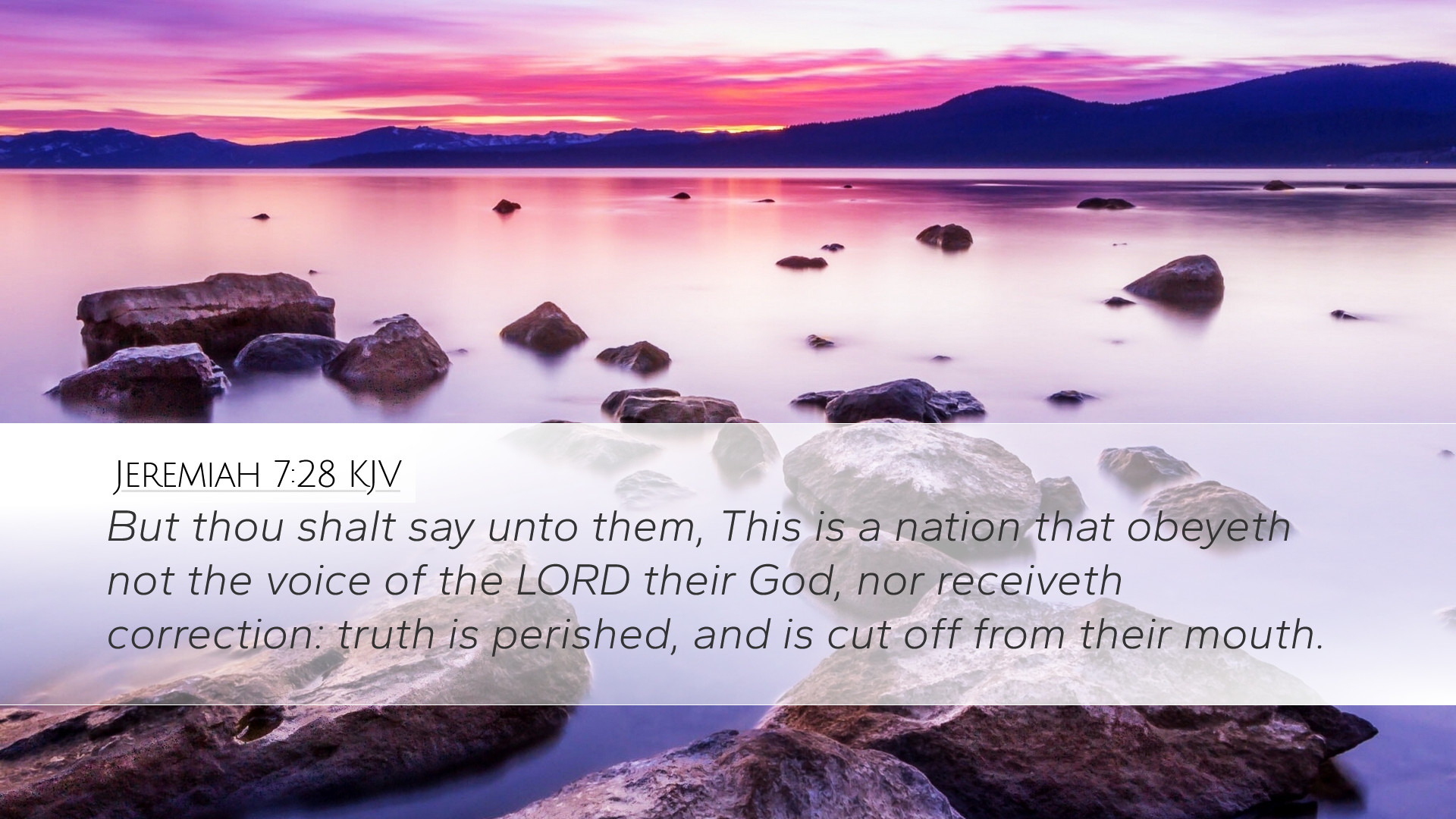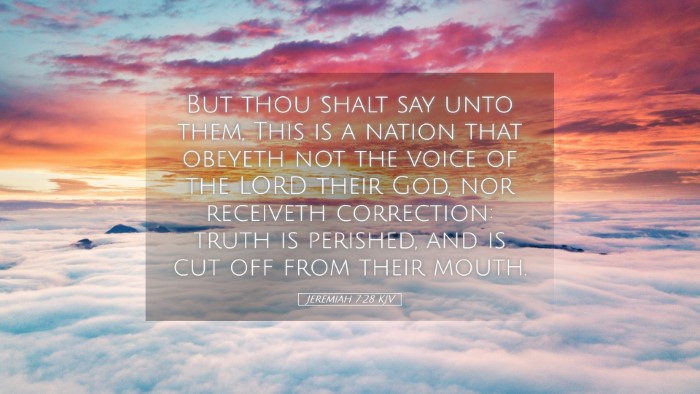Commentary on Jeremiah 7:28
Jeremiah 7:28 states: "But you shall say to them, ‘This is the nation that did not obey the voice of the Lord their God or accept correction; truth has perished; it has been cut off from their mouth.’" This verse encapsulates a profound message about the state of God's people and their continual rebellion against divine instruction. The following commentary draws from several public domain sources, elaborating on its theological implications.
Contextual Overview
Jeremiah, often referred to as the weeping prophet, speaks to Judah during a time of great turmoil and impending judgment. The entire chapter emphasizes the consequences of rejecting God's commands, showcasing a nation that has turned away from true worship towards mere ritualism.
Insights from Matthew Henry
Henry remarks that this verse serves as a stark reminder of the consequences of disobedience. He emphasizes that Israel's refusal to listen is indicative of a broader spiritual malaise:
- Disobedience to God's voice: Israel's failure to heed God's word leads to dire consequences. Henry notes that rejection of divine authority ultimately results in the loss of truth.
- Rejection of correction: The nation is criticized for not accepting God’s corrections, exposing their obstinance. This highlights the importance of humility and the need for repentance.
- Truth cut off: When a society refuses to acknowledge God's truth, it leads to moral decay. This is a warning for modern-day believers about the necessity of staying rooted in divine teachings.
Insights from Albert Barnes
Barnes sheds light on the spiritual implications of 'truth' being described as 'perished' in this verse. He interprets this as a loss of moral clarity and integrity among the people:
- The nature of truth: Barnes notes that truth is essential for spiritual and societal health. Its absence indicates a deeper spiritual collapse.
- The consequences of ignoring God: He underscores that the refusal to accept correction leads to divine judgment. Barnes warns that such obstinate actions breed significant repercussions, both individually and collectively.
- The call to obedience: Barnes sees in this verse a powerful exhortation to obey God’s word. He encourages believers to embrace God's teachings actively rather than passively rejecting them.
Insights from Adam Clarke
Clarke provides further depth by examining the spiritual and societal implications of ignoring God's commands:
- The role of the prophet: He reflects on Jeremiah’s role as a prophet — a voice crying out to a nation in rebellion, warning them of their impending judgment.
- The erasure of truth: Clarke highlights that when truth is discarded, it is akin to spiritual death.
The loss of divine truth translates into a society that is lost, disoriented, and susceptible to various deceptions.
- Encouragement to believers: Clarke emphasizes that the faithful must persist in proclaiming God's truth, regardless of societal trends that may oppose it.
Thematic Reflections
This verse is rich in themes that resonate deeply with contemporary believers and scholars:
- Disobedience and Its Consequences: The recurring idea of disobedience serves as a reminder for both individuals and communities to evaluate their faithfulness to God.
- The Importance of Truth: In a world where truth is often subjective, Jeremiah 7:28 challenges believers to cling to the objective truth found in Scripture.
- The Call for Repentance: This passage encourages an introspective look at one’s life and the necessity of repentance, echoing the continuous need for a humble heart.
Practical Applications
For pastors, students, and theologians, the insights from Jeremiah 7:28 can serve as a basis for various applications in ministry and personal life:
- Preaching and Teaching: Pastors can leverage the message of obedience and the necessity for believers to anchor themselves in God’s truth in their sermons.
- Personal Reflection: Each believer should consider their own responsiveness to God’s voice and be open to His corrections.
- Community Engagement: Encourage local churches to create spaces for dialogue about truth, obedience, and societal issues, facilitating a healthier understanding of God's word.
Conclusion
Jeremiah 7:28 serves as a poignant reminder of the importance of obedience to God's voice and the critical nature of truth. The commentary insights from Matthew Henry, Albert Barnes, and Adam Clarke collectively emphasize the dire consequences of disobedience while simultaneously calling for a return to humility, repentance, and engagement with divine truth. As we reflect on this scripture, let us be vigilant in our pursuit of God's voice, ever attentive to the corrections He offers, and committed to the truth that leads to restoration and spiritual vitality.


